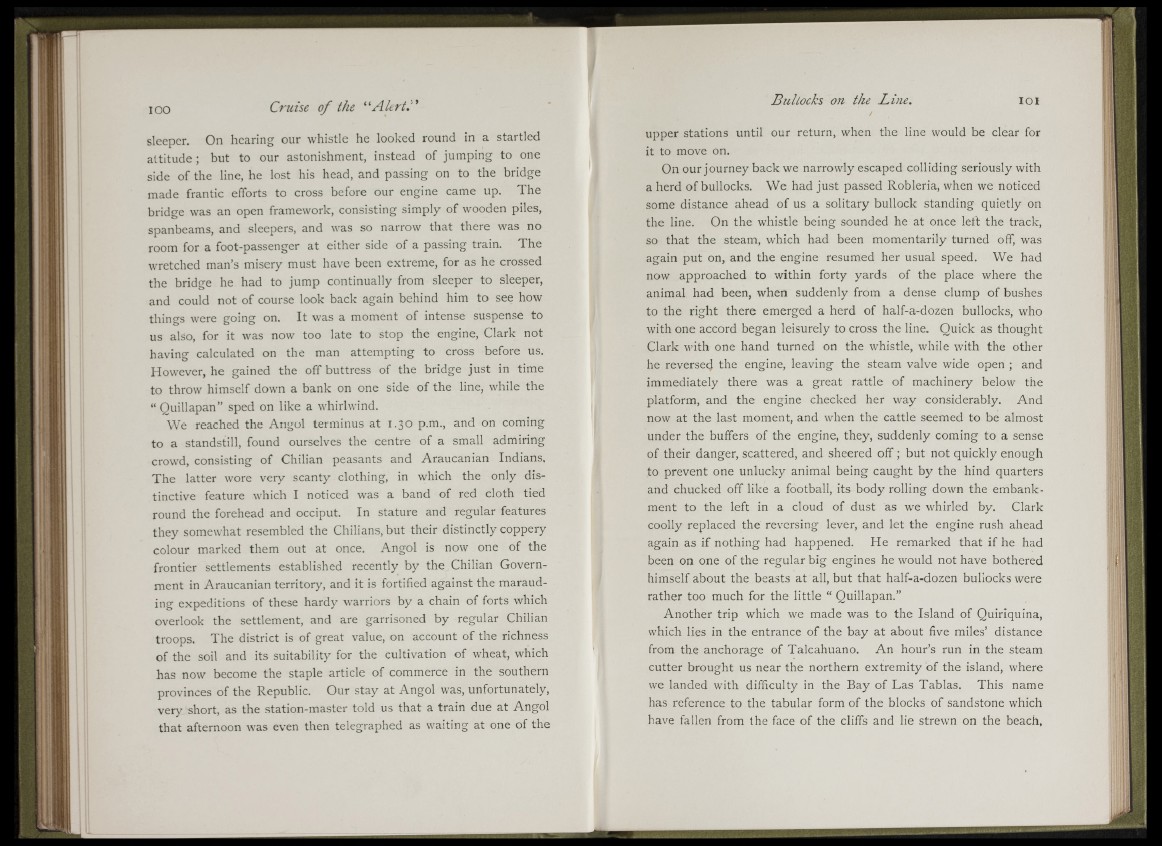
f!
iifii
m
lU
lOO Cruise of the “ Alert!”
sleeper. On hearing our whistle he looked round in a startled
altitude; but to our astonishment, instead of jumping to one
side of the line, he lost his head, and passing on to the bridge
made frantic efforts to cross before our engine came up. The
bridge was an open framework, consisting simply of wooden piles,
spanbeams, and sleepers, and was so narrow that there was no
room for a foot-passenger at either side of a passing train. The
wretched man’s misery must have been extreme, for as he crossed
the bridge he had to jump continually from sleeper to sleeper,
and could not of course look back again behind him to see how
things were going on. It was a moment of intense suspense to
us also, for it was now too late to stop the engine, Clark not
having calculated on the man attempting to cross before us.
However, he gained the off buttress of the bridge just in time
to throw himself down a bank on one side of the line, while the
“ Quillapan” sped on like a whirlwind.
We reached the Angol terminus at 1.30 p.m., and on coming
to a standstill, found ourselves the centre of a small admiring
crowd, consisting of Chilian peasants and Araucanian Indians.
The latter wore very scanty clothing, in which the only distinctive
feature which I noticed was a band of red cloth tied
round the forehead and occiput. In stature and regular features
they somewhat resembled the Chilians, but their distinctly coppery
colour marked them out at once. Angol is now one of the
frontier settlements established recently by the Chilian Government
in Araucanian territory, and it is fortified against the marauding
expeditions of these hardy warriors by a chain of forts which
overlook the settlement, and are garrisoned by regular Chilian
troops. The district is of great value, on account of the richness
of the soil and Its suitability for the cultivation of wheat, which
has now become the staple article of commerce in the southern
provinces of the Republic. Cur stay at Angol was, unfortunately,
very short, as the station-master told us that a train due at Angol
that afternoon was even then telegraphed as waiting at one of the
Bullocks on the Line. lo i
upper stations until our return, when the line would be clear for
it to move on.
Cn our journey back we narrowly escaped colliding seriously with
a herd of bullocks. We had just passed Roblería, when we noticed
some distance ahead of us a solitary bullock standing quietly on
the line. Cn the whistle being sounded he at once left the track,
so that the steam, which had been momentarily turned off, was
again put on, and the engine resumed her usual speed. We had
now approached to within forty yards of the place where the
animal had been, when suddenly from a dense clump of bushes
to the right there emerged a herd of half-a-dozen bullocks, who
with one accord began leisurely to cross the line. Quick as thought
Clark with one hand turned on the whistle, while with the other
he reversed the engine, leaving the steam valve wide open ; and
immediately there was a great rattle of machinery below the
platform, and the engine checked her way considerably. And
now at the last moment, and when the cattle seemed to be almost
under the buffers of the engine, they, suddenly coming to a sense
of their danger, scattered, and sheered o f f ; but not quickly enough
to prevent one unlucky animal being caught by the hind quarters
and chucked off like a football, its body rolling down the embankment
to the left in a cloud of dust as w'e whirled by. Clark
coolly replaced the reversing lever, and let the engine rush ahead
again as if nothing had happened. He remarked that if he had
been on one of the regular big engines he would not have bothered
himself about the beasts at all, but that half-a-dozen bullocks were
rather too much for the little “ Quillapan.”
Another trip which we made was to the Island of Quirlquina,
which lies in the entrance of the bay at about five miles’ distance
from the anchorage of Talcahuano. An hour’s run in the steam
cutter brought us near the northern extremity of the island, where
vve landed with difficulty in the Bay of Las Tablas. This name
has reference to the tabular form of the blocks of sandstone which
have fallen from the face of the cliffs and lie strewn on the beach.
1
5.1
::|l'